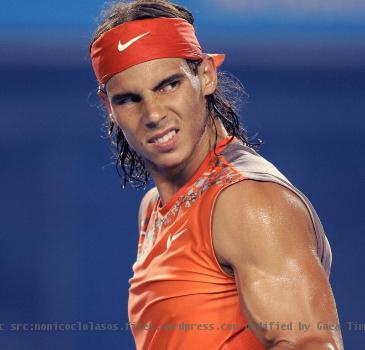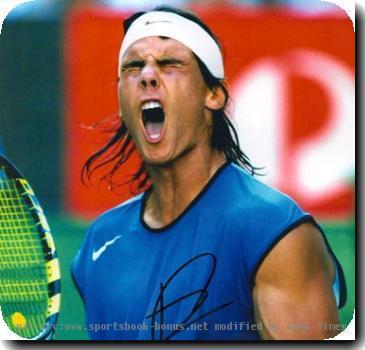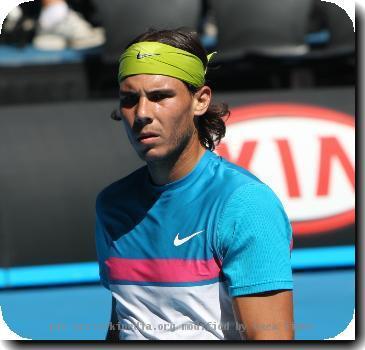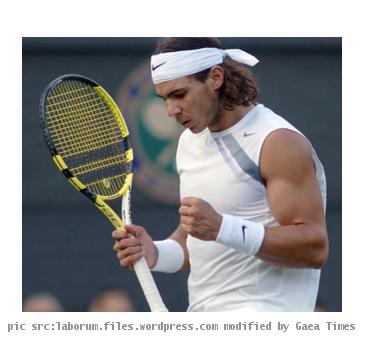Iniesta scores in extra time to give Spain its first World Cup with 1-0 win over Netherlands
By Barry Wilner, APMonday, July 12, 2010
Spain beats Netherlands 1-0 for first World Cup
JOHANNESBURG — They kissed and hugged and held high the golden trophy for all of Soccer City and Africa and the world to see. The exhaustion was gone now for Spain’s players, replaced by the exhilaration of winning the World Cup at long, long last.
A testy and often dirty match was won by Andres Iniesta’s goal late in extra time Sunday night. The 1-0 victory over the Netherlands before a shivering crowd at Soccer City Stadium gave Spain its first World Cup, and put the European champion Spaniards in elite company.
“I remember (Italy captain Fabio) Cannavaro told me that being world champion doesn’t happen every day,” captain Iker Casillas said. “This really is quite a cup. The European Championship was the most important moment of our lives, but today is much bigger than anything else.”
For years, Spain has been a disappointment in the biggest tournaments. Now, it has joined West Germany and France as the only nations to hold the world and European titles at the same time.
It took four straight 1-0 wins — the Spaniards scored eight goals, an all-time low for a World Cup champion — and the heroics of Iniesta and Casillas to reach the pinnacle so often predicted for Spain and never before reached. In the tightest World Cup ever, with 31 games decided by one goal, Spain always found a way.
“We have all done an incredible job,” Iniesta said. “I don’t think we even realize what we have done.”
Well, maybe a little.
The winners struggled but managed to lift their coach, Vicente del Bosque, in the air in celebration.
“We owe this to the 23 players. We’ve had 50 days without any incident, it makes you proud to be with these players.”
Then the players made a quick costume change from their sweat-soaked blue jerseys into their traditional red ones.
Casillas accepted the trophy from FIFA president Sepp Blatter, who was bundled in a scarf because temperatures dipped into the 40s on this chilly winter’s night in the Southern Hemisphere.
Casillas, voted the World Cup’s top goalkeeper, smooched the distinctive gold award and raised it for all to see while cameras flashed and confetti flew throughout the still-full stadium.
Soon, the entire team and staff gathered at midfield for a group photo. The players bounced up and down to the World Cup theme song, then took a victory lap as the trophy was passed to each member of the squad.
“It’s the most beautiful that there is. It’s spectacular,” Iniesta said.
The game was anything but spectacular — the entire tournament was like that — and Spain’s victory was marred by a pair of bombings in the East African nation of Uganda. Explosions ripped through crowds watching the game in two places in Uganda’s capital late Sunday, killing 64 people, police said. One American was killed and several were wounded. Police feared an al-Qaida-linked Somali militant group was behind the attacks.
The final was a physical test of attrition that sometimes turned filthy — a finals-record 14 yellow cards were handed out and the Dutch finished with 10 men. In the end, it was Iniesta breaking free in the penalty area, taking a pass from Cesc Fabregas and putting a right-footed shot from 8 yards just past the outstretched arms of goalkeeper Maarten Stekelenburg with about seven minutes left to play, including injury time.
“When I struck it, it just had to go in,” Iniesta said.
For the Dutch and their legions of orange-clad fans wearing everything from jerseys to jumpsuits to clown gear to pajamas, it was yet another disappointment.
Even with their first World Cup title tantalizingly within reach, they failed in the final for the third time. This one might have been the most bitter because, unlike 1974 and 1978, the Netherlands was unbeaten not only in this tournament, but in qualifying for the first World Cup staged in South Africa.
Soccer City was soaked in Oranje, from the seats painted in that hue throughout the stadium to pretty much everyone seated in them, including crown prince Willem-Alexander. It was different when they lost to hosts West Germany and Argentina in previous finals; this time, the Dutch were something of a home team. And the visitors won.
“It’s a pity, but I think we can be proud of it, the whole country,” midfielder Wesley Sneijder said.
Spain had pockets of supporters, too, with fans dressed in red and scattered throughout the stadium. Among those cheering were Queen Sofia, Rafael Nadal and Pau Gasol.
Spain’s fans might have been in the minority, but when the final whistle blew, they were tooting their vuvuzelas with a vengeance in tribute to their champions.
But they had to shiver and wait anxiously for the goal to come.
A second straight World Cup final headed into extra time, with the goalkeepers unbeatable. Stekelenburg, relatively inexperienced on the international level, made a spectacular left leg save when Fabregas broke free early in overtime.
The goal in the 116th minute came off a turnover by the Dutch defense that Fabregas controlled just outside the penalty area. Iniesta stayed on the right and sneaked in to grab the pass and put his shot to the far post.
And with that, Iniesta tore off his jersey and raced to the corner where he was mobbed by his teammates.
“I had the opportunity to score that goal which was so important to my team,” he said. “It’s something absolutely incredible. I simply made a small contribution to my team.”
Several Dutch players wiped away tears as they received their runners-up medals — yet again. They had won every qualifying match and all six previous games in South Africa before the bitter ending.
The Netherlands now has more victories in World Cup games without a title than any nation: 19. Spain held that dubious record with 24.
Netherlands coach Bert van Marwijk took off his silver medal as soon as he left the podium, a look of disgust on his face.
“At this moment I cannot think very well, we just lost the World Cup final,” Sneijder said.
Aside from a European title in 1988, the Dutch have been classic underachievers on the pitch.
Yet the Spaniards haven’t been much better. Other than Euro championships in 1964 and 2008, they rarely have contended in major tournaments. At least the Netherlands made those two World Cup finals and advanced to the semifinals in 1998.
Second-ranked Spain started this World Cup in the worst way, losing to Switzerland. But Spain won every game after that, including a 1-0 victory over powerful Germany that was far more one-sided than the score indicated. No other nation has won the World Cup after losing its opener.
“They made it very difficult for us to play comfortably,” Del Bosque said. “It was a very intense match.”
Yet the most dangerous player Sunday was Netherlands forward Arjen Robben. He had a rare breakaway in the 62nd minute after a brilliant through pass from Sneijder. He had the ball on his preferred left foot, but a charging Casillas barely got his right leg on the shot to deflect it wide of the gaping net.
Then it was Stekelenburg’s turn, holding his ground after a misplay in front of the net gave the ever-potent David Villa an open shot.
As play opened up, the crowd of 84,490 got quieter in nervous anticipation of the goal that would win the World Cup.
Robben again looked as though he might get it with a burst of speed past the defense, but Casillas sprinted from his net and smothered the ball before Robben could take a shot.
“You felt that the team that would score first would win,” Van Marwijk said. “We had two great chances through Arjen. We made a real game out of it.”
Before the game, former South African president Nelson Mandela received a huge ovation when he was driven onto the field on a golf cart. A smiling Mandela waved to the fans as the vuvuzelas buzzed throughout Soccer City.
And after the game, Iniesta took time to salute Paul the Octopus, who correctly picked the winner of eight matches.
“As for the octopus, what can I say?” Iniesta said, smiling. “We won and I’m sure the octopus will be more popular in Spain.”
Not nearly as popular as the golden generation of players who have carried Spain to the top.
Tags: 2010 Fifa World Cup, Africa, Europe, Events, Germany, Iker casillas, Iniesta, International Soccer, Johannesburg, Men's Tennis, Netherlands, Rafael nadal, South Africa, Southern Africa, Spain, Uganda, Western Europe, World Cup



